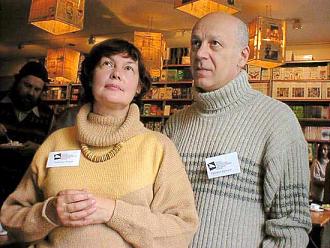Нет уже ни пространства, ни времени,
ни страдания, ни языка.
Только музыка в городе Бремене
все еще существует, легка.
Крендель вновь золотится над булочной,
как бессмысленной жизни итог,
и во тьме расцветает полуночной
отвратительный белый цветок.
В пыльных зарослях желтой акации,
обступившей пустынный перрон,
мы открыли закон гравитации -
но на души не действует он.
И опять поднимаешься в гору ты,
чтоб не сыпалась жизнь, как труха:
животы циферблатов распороты,
обнажились часов потроха.
Умираем мы, спим и обедаем,
громко плачем, слова говорим,
и какие-то цели преследуем,
и не ведаем, что мы творим.
Закачаются ветви еловые,
как ресниц ослепительный взмах -
и появятся круглоголовые
дети смерти в родильных домах.
Нет ни меда, ни хмеля, ни солода,
ни горящей воды, ни огня.
Пляшет в небе проклятое золото,
второпях убивает меня.
Ты расколешь луну, как посудину,
и научишься к старости гнать
неуемное племя иудино,
чтобы юность свою вспоминать, -
как крылатые лошади цокали
по горячим камням мостовой,
Мандельштама мы видели, Блока ли,
уходящими вниз головой
в непомерные ямы воздушные,
где беременны смертью слова,
где живет и твоя непослушная,
золотая твоя голова...
1993
Короткие
письма
В сокращении
СПб.: Пушкинский фонд, 1999.
Серия
"Автограф",
[вып.31].
ISBN
5-89803-021-2
64 с. |
Already, no more suffering, no
more speech nor space nor time.
In the city of Bremen, only music
still survives and light.
Over the bakery, a pretzel gleams,
summing up foolish life,
and in the dark of midnight
a repulsive white flower blooms.
Dusty brakes of yellow acacia
clustered around and empty
platform
revealed the law of gravity,
but its effect on the spirit was
slight.
Life should not slip away like
dross.
Again you climb the hill, but
the faces ripped open like bellies
disclose only the viscera of
clocks.
We die, we sleep and eat,
weep loudly, form words
and pursue certain ends,
with no idea of what it’s all
about.
The fir-tree branches flutter
in a dazzle of eyelashes,
and round-headed nurslings of
death
materialise in the maternity
wards.
No more honey, hops or malt,
no burning water, no fire.
The blasted gold cavorts across
the sky,
in too much of a hurry.
You’ll break the moon like
crockery
and, approaching old age, learn
how
to persecute those irrepressible
Jews.
So your youthful days return.
How the winged horses clip-clopped
over the hot paving stones of the
bridge.
We saw Mandelstam, or Block,
head bowed, walking off
into inordinately deep
air-pockets,
where words echo death’s knell,
where your disobedient golden head
still seems to be alive.
|
|
